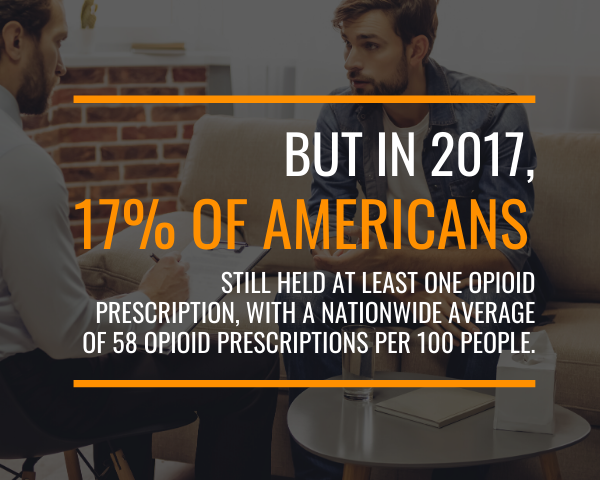
Prescription drugs are medically necessary for the life, happiness, and comfort of millions of people. Some 4.3 billion prescriptions were written in 2018, offering individuals pain relief, abatement of mental disorders, symptom management, and temporary relief for injuries and surgeries. But, with 131 million people, or some 66% of all U.S. adults, receiving prescription medication, that system will sometimes go wrong. This is especially evident in the case of drugs like amphetamines, opioids, and benzodiazepines, which serve a valuable purpose, but are addictive, and damaging to mental and physical health when abused.
This knowledge has led to a recent reduction in duration and volume of prescriptions for these types of drugs. But in 2017, 17% of Americans still held at least one opioid prescription, with a nationwide average of 58 opioid prescriptions per 100 people.
If you or a loved one is struggling with substance abuse or addiction, it’s important to get help. Drug abuse can damage physical health, cause long-lasting mental health problems, and result in negative repercussions to social life, careers, and relationships.
At the Gooden Center, we know that no one chooses to become an addict.
Substance use disorder is complex, often resulting from underlying mental and behavioral problems, and most importantly, treatable. Patients stepping into our Pasadena rehab center for prescription drug abuse will find a warm, welcoming, and compassionate environment, complete with qualified staff to guide you through every step of recovery.
Signs of Prescription Drug Addiction
Prescription drugs include a range of highly addictive substances including benzodiazepines, opioids, amphetamines, and other stimulants. This means that the signs of prescription drug addiction can vary significantly. However, this list compiles some of the most common signs of abuse and addiction across different types of drugs.
Physical Side Effects of Prescription Drug Abuse
Anyone who takes too much of a drug will show side-effects, which typically aren’t there when the drug is taken as prescribed. Ritalin and amphetamine doses are never high enough to cause active excitement in normal users. Painkillers are never dosed high enough to cause individuals to appear stoned or very lethargic. So, noticing differences from “normal” is one very common sign of drug abuse.
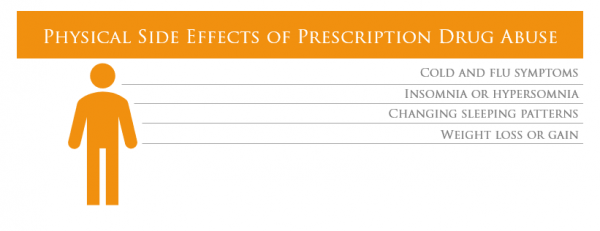
Mental Side Effects
Mental side effects are typically much easier to notice across different types of drugs, because they are often very similar. Importantly, stimulants such as amphetamines will result in violent and paranoid behavior, while other types of drugs usually will not.
Depending on the prescription drug in question, individuals might also show spikes in energy, frequent periods of lethargy, depression, or even a seeming inability to feel after being high.
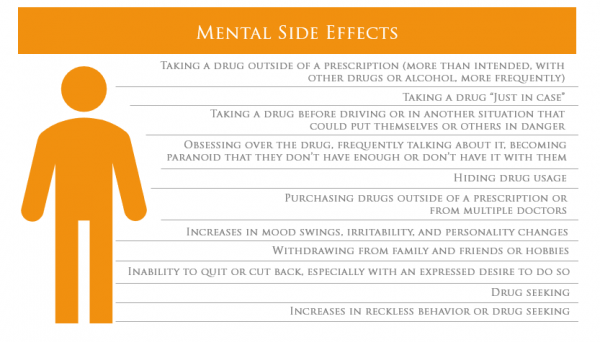
Prescription Drug Withdrawal
Most prescription drugs result in drug tolerance, where the body adjusts to a drug and you need more to achieve the same result. Chemical dependence happens when someone continues using after developing tolerance and having the drug in the system becomes the new “Normal”. Individuals at this stage might not be addicted, but they will experience withdrawal when quitting the drug.
Withdrawal profiles can be quite different depending on drugs. In most cases, symptoms will also vary heavily, but may include:
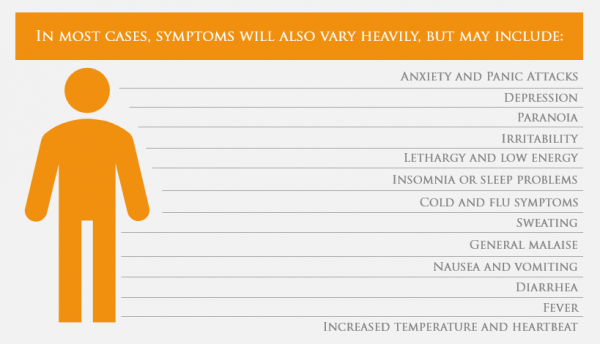
In most cases, you can expect withdrawal timelines to follow a distinct pattern depending on the type of drug. This can vary significantly, even with the same type of drug. For example, withdrawal for a benzodiazepine is typically about 4-8 weeks. This can more than triple for a slow-release or extended release variation of the drug.
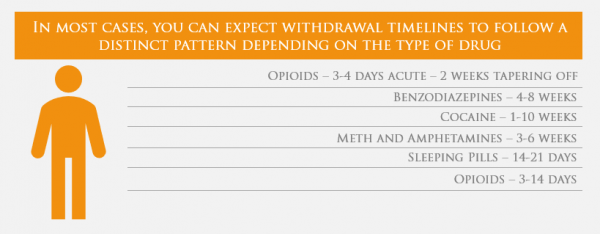
Many prescription medications are dangerous to quit “cold turkey”. Always consult with a medical professional and seek support and medical monitoring during detox.
Prescription Drug Addiction Treatment

No one plans to be addicted, but everyone who is addicted can recover. Addiction is a complex mental disorder involving a combination of physical dependence, behavioral disorders, and mental health problems. It is fully treatable, and every individual can recover with time, motivation, and care. The Gooden Center offers science-based prescription drug addiction treatment in Los Angeles and surrounding areas, with a focus on holistic, personal care. Our personalized approach means that every patient at our non-profit rehab facility receives the therapy, counseling, and treatment best suited for their problems. Our focus on mental health also makes us ideal for assisting patients with dual diagnosis, such as individuals taking medication for chronic pain, mental health disorders, or PTSD.
Our approach uses behavioral therapy like DBT, CBT, and ACT, alongside programs to support your physical and mental health.
